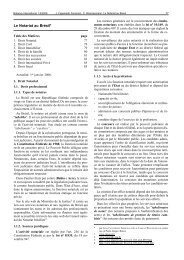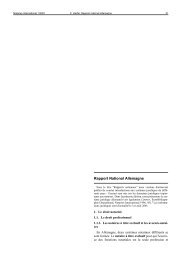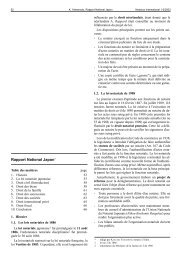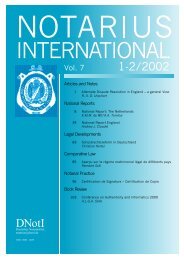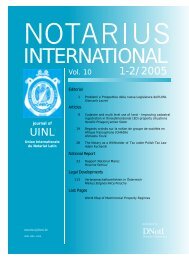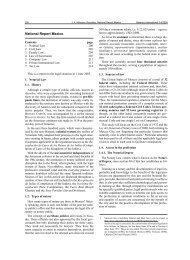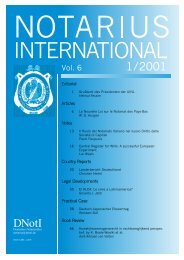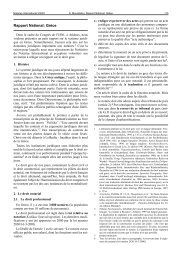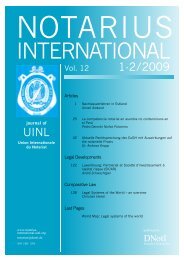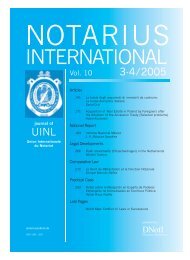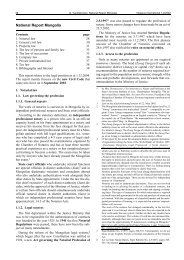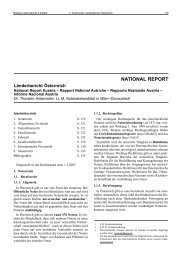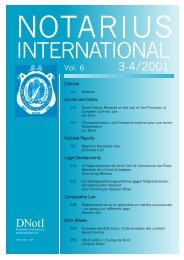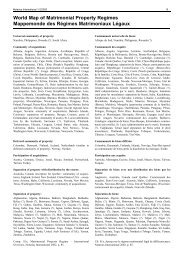ARTICLES and NOTES - Notarius International
ARTICLES and NOTES - Notarius International
ARTICLES and NOTES - Notarius International
Create successful ePaper yourself
Turn your PDF publications into a flip-book with our unique Google optimized e-Paper software.
140 T. Antenreiter, National Report Austria <strong>Notarius</strong> <strong>International</strong> 3-4/2002<br />
is to one third of the statutory portion of the deceased’s<br />
estate 62 . The compulsory portion is only, however, a pecuniary<br />
claim, so that the person entitled to a compulsory<br />
portion (also known as a forced heir) cannot assert a<br />
claim to particular objects in the estate.<br />
Furthermore, a child’s compulsory portion can be reduced<br />
by half once again if a parent <strong>and</strong> the child entitled<br />
to a compulsory portion at no time had a close relationship,<br />
as usually exists between parents <strong>and</strong> children.<br />
As a rule this provision refers to children born out of<br />
wedlock who had no contact whatsoever with their natural<br />
father, but in such cases the compulsory portion cannot<br />
be reduced if the parent refused personal contact with<br />
the child for no reason 63 .<br />
In order to prevent the deceased giving away all his assets<br />
during his lifetime <strong>and</strong> thereby restricting the rights<br />
of the forced heirs, Austrian law provides that gifts inter<br />
vivos can, under certain conditions, also be brought in as<br />
a basis of assessment for calculating the compulsory portions<br />
of the children <strong>and</strong> the surviving spouse, but not,<br />
however, the parents (adding back of advancements ) 64 .<br />
If there are insufficient funds in the estate available to<br />
cover the compulsory portions thus calculated, the donees<br />
may even be obliged to give back the gifted item in<br />
favour of the forced heirs or make compensation payments<br />
(setting aside a gift) 65 .<br />
5.5 Substitute succession, legacies <strong>and</strong> testamentary<br />
obligations<br />
Under Austrian law it is possible to appoint firstly one<br />
person as prior heir <strong>and</strong> at the same time stipulate that another<br />
person shall receive the inheritance as substitute<br />
heir on the occurrence of a particular event, usually in the<br />
event of the death of the prior heir (fideicommissary<br />
substitution) 66 . In such cases, for the protection of the<br />
substitute heir, it is m<strong>and</strong>atory for an inventory of the estate<br />
to be drawn up. As such dispositions considerably restrict<br />
the extent to which the items affected may be<br />
passed on, fideicommissary substitution can only be directed<br />
in respect of contemporaries or in favour of a maximum<br />
of two further generations 67 .<br />
The prior heir is in the position of a usufructary 68 <strong>and</strong><br />
is thus not permitted to diminish the intrinsic value of the<br />
inheritance <strong>and</strong> can only dispose of the items affected<br />
with the consent of the substitute heir. Even in the case of<br />
an unequivocal testamentary direction by a testator the<br />
prior heir <strong>and</strong> the substitute can set aside the fideicommissary<br />
substitution by mutual agreement.<br />
The rules relating to fideicommissary substitution apply<br />
correspondingly in the case of substitute legatees<br />
<strong>and</strong> in the case where there are directions imposing time<br />
limits, conditions <strong>and</strong> obligations to be performed (socalled<br />
constructive substitute succession) 69 .<br />
Austrian law distinguishes between the heir, who acquires<br />
his legal status as universal successor of the deceased,<br />
<strong>and</strong> the recipient of a legacy (also called a legatee),<br />
who merely receives a certain item bequeathed by<br />
the deceased <strong>and</strong> becomes individual successor only in<br />
relation to this item. Accordingly the legatee only has a<br />
claim under the law of obligations against the heir for<br />
transfer of ownership of the bequeathed object (civil law<br />
legacy – Damnationslegat), which in terms of value,<br />
however, can make up the greater part or even the whole<br />
of the estate 70 .<br />
In the case where testamentary obligations are imposed,<br />
compliance with them is not checked by the probate<br />
court, apart from a few exceptions in the case of testamentary<br />
obligations in the public interest 71 . A person<br />
entitled to performance of a testamentary obligation<br />
(for example, an executor, but not the beneficiary in respect<br />
of performance of the testamentary obligation himself),<br />
can insist upon fulfilment of the testamentary obligation,<br />
if need be enforcing it by recourse to law. Nonfulfilment<br />
of a testamentary obligation operates in principle<br />
as a resolutive condition 72 , but in the case of testamentary<br />
obligations approximate fulfilment is sufficient<br />
for the purposes of the deceased’s testamentary wishes;<br />
in the case of non-fulfilment where there is absence of<br />
fault, the testamentary obligation expires in any event 73 .<br />
5.6. Execution of a will<br />
The legal institution, the executor, does not have any<br />
great significance in Austrian legal practice. Only one<br />
paragraph in the General Civil Code is devoted to this<br />
topic, which leaves a lot of questions on this matter still<br />
open 74 . According to Austrian case law, the testamentary<br />
appointment of an executor by the deceased in principle<br />
does not represent a binding direction to the heir. Thus<br />
the heir can dismiss the person of the executor, except if<br />
the deceased declared his last wishes expressly by means<br />
of a testamentary obligation in such a way that the heir<br />
has to tolerate the executor or lose the bequest.<br />
The rights of the executor under Austrian law include<br />
supervising <strong>and</strong> carrying out the fulfilment of the deceased’s<br />
testamentary wishes <strong>and</strong> participation in the<br />
drawing up of the inventory of the estate. Should the case<br />
arise the executor is the person entitled to performance of<br />
a testamentary obligation. In principle, however, he has<br />
no direct representative competence either for the estate<br />
or for its heirs, except if he is entrusted by the probate<br />
court with attending to certain specific matters, such as<br />
an estate guardian or curator.<br />
5.7. Probate proceedings<br />
Estate administration is carried out in Austria by the<br />
local courts (Bezirksgericht), in non-contentious proceedings,<br />
with significant involvement by the notaries<br />
62 Arts. 765 <strong>and</strong> 766 ABGB (General Civil Code)<br />
63 Art. 773a ABGB (General Civil Code)<br />
64 Art. 785 ABGB (General Civil Code)<br />
65 Arts. 951 <strong>and</strong> 952 ABGB (General Civil Code)<br />
66 Art. 608 ABGB (General Civil Code)<br />
67 Details in Arts. 611 <strong>and</strong> 612 ABGB (General Civil Code)<br />
68 Art. 613 ABGB (General Civil Code)<br />
69 Arts. 707 to 709 ABGB (General Civil Code)<br />
70 Art. 690 ABGB (General Civil Code)<br />
71 Art. 161a General Rules on Civil Procedure in Non-contentious Matters<br />
72 Art. 709 ABGB (General Civil Code)<br />
73 Art. 710 ABGB (General Civil Code)<br />
74 Art. 816 ABGB (General Civil Code)



